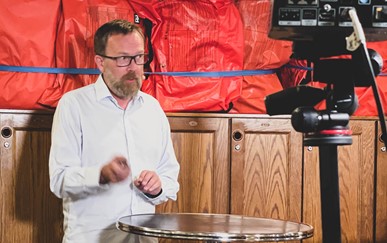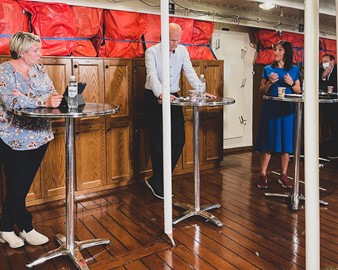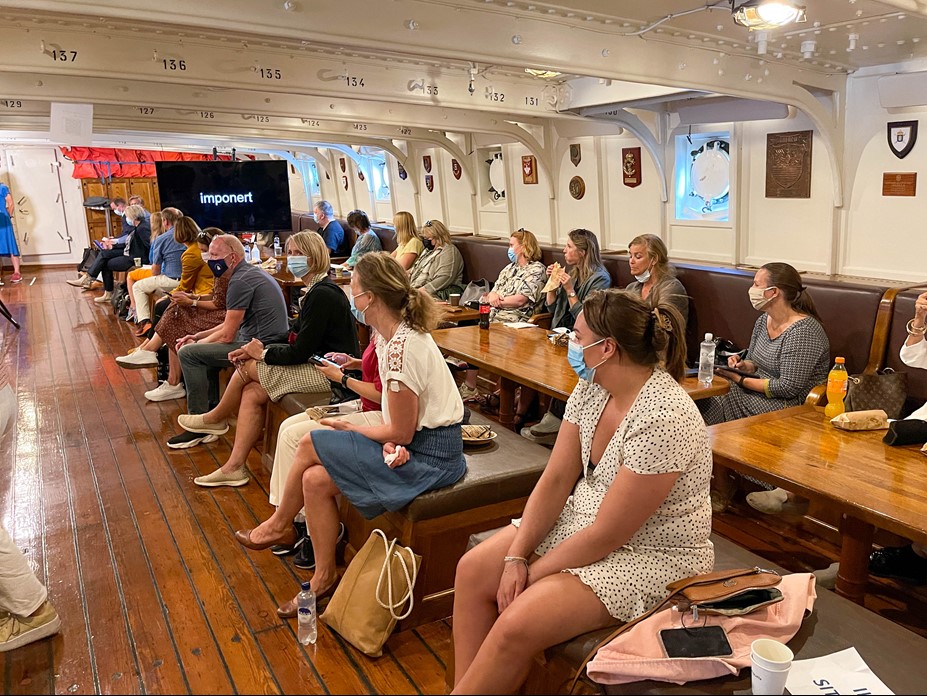Read the story in Norwegian here.
Recording is available here (in Norwegian).
The topic was "Can new technology strengthen a sustainable democracy". The event was held on board the venerable tall ship, Statsraad Lehmkuhl, for a packed audience.
Important tool for editorial media
One of the topics discussed was how the influx and extent of fake news affected the position of the editorial media.
– The role of journalists becomes more critical in the face of false news. New technology can make it easier to distinguish correct information from false information, said Hans-Henrik Merckoll, IBM Norway.
Håkon Bergsjø (Norwegian National Security Authority) also emphasized the role of the media.
– Fake accounts, fake profiles, and fake news are a challenge. Still, fortunately, we have the editorial media working to correct this landscape all the time. In that sense, we are in a good position in Norway compared to other parts of the world.
Lars Helle, editor-in-chief of Stavanger Aftenblad, pointed out that good fact-checking and source review is getting increasingly challenging, even for experienced journalists.
– In the face of today's reality, we must have a completely different way of checking information and sources than what we have been used to so far. In the future, we must apply technology as a tool to develop good editorial journalism, Helle said.
In the face of today's reality, we must have a completely different way of checking information and sources than what we have been used to so far.
The Media City Bergen community is working systematically with these challenges. The new research center, "SFI MediaFutures; Research Centre for Responsible Media Technology & Innovation", opened earlier this year.
The center will develop responsible media technology for the future and focuses on user groups, user experience, content production, language and accessibility. The goal is to develop responsible solutions and new technology by addressing the societal effects of artificial intelligence, fake news, echo chambers, and political polarization.
Crises provide good conditions for conspiracy theories
 During the pandemic, disinformation and conspiracy theories have spread in Norway and globally at record speed, as Eirik Solheim (NRKbeta) demonstrated in his introduction. He showed how text, speech, photo and video could be easily manipulated and falsified to appear as something completely different.
During the pandemic, disinformation and conspiracy theories have spread in Norway and globally at record speed, as Eirik Solheim (NRKbeta) demonstrated in his introduction. He showed how text, speech, photo and video could be easily manipulated and falsified to appear as something completely different.
The consequences can be severe, Anne Jacobsen, CEO of Media City Bergen, pointed out.
– "Fake news" is not the news we do not like. It is false information designed and aimed to harm. During the pandemic, we have seen that thousands of people have made important decisions based on demonstrably incorrect information. This can lead to major unfortunate ripple effects for society and democracy, Jacobsen said.
– Political action is needed
The panelists also discussed possible solutions. Hilde Nagell, advisor in Agenda, called for political action. Nagell is the author of "Digital Revolution - how to take back power and freedom". She describes how big tech such as Facebook has strengthened its power and position at the expense of the people.
– The tech platforms' advertising-financed business models have given deep fake and false information better conditions. It is still possible to reverse this development, but that will require actions from politicians to regulate what and how algorithms are used, Nagell said.
– We cannot expect everyone to be their own editor
The event concluded with a political discussion between Michael Tetzschner (H) and Marte Mjøs Persen (Ap). Tetzschner emphasized that politicians themselves must have a critical view of their own activity in social media.
– As politicians, we have a responsibility for the information we share on social media. Therefore, it is vital that we start with ourselves, and that we are critical of what information we share, Tetzschner said.
We need a political commitment to strengthen the environments and research facilities in this field to develop tools and technology to fight fake news
Mjøs Persen said it is necessary to strengthen the environments that can help limit the spread of fake news, and thus the harmful effects.

– We can not expect everyone to be their own editor. It is too much responsibility to put on the individual. We need a political commitment to strengthen the environments and research facilities in this field, to develop tools and technology to fight fake news, Mjøs Persen said.
Anne Jacobsen agreed.
– It is becoming increasingly difficult for everyone to uncover what is credible information and what is not. We need new tools, methods, and technology. We must establish a national capacity in this area, where research, collaboration, technology development, and policy are developed, so that we also in the future can ensure that we all make choices and decisions based on information we can trust.

